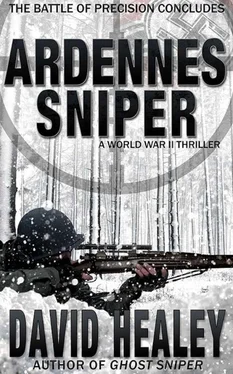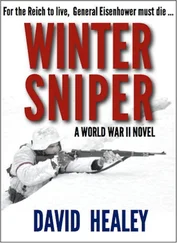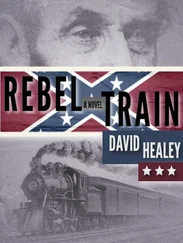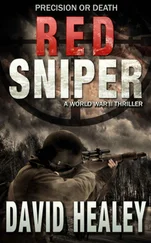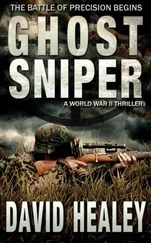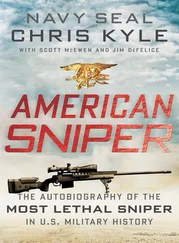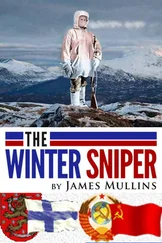“I must have just missed him. I just came by there. I saw how that girl got shot. What a waste of fine poontang, if you know what I’m saying. I would have liked to tap that.”
The Kid looked like he was about to be sick.
Cole put a hand on the Kid’s knee, then looked at the corporal and said good naturedly. “I done shot six Nazis already today. It’s like a turkey shoot. They don’t even shoot back. You want to try?”
The corporal looked at Cole, then at the scoped rifle in his hand.
“You serious?”
“Dead serious,” Cole said, offering the rifle. “Go ahead. Shoot one. You’ll have a story to tell your grand kids.”
The corporal took the rifle eagerly. “What do I do?”
“Go on over to that wall and take a peek through the scope. When you see a Nazi, you just put the crosshairs on him and pull the trigger. Just like shooting rats at the dump.”
“I’ll give it a try.”
Muckelroy started toward the wall. The others watched, curious, wondering what Cole was up to. Cole called the man back.
“Hold on, let me trade helmets with you. This here’s a special sniper helmet, shaped so it won’t get in the way of the scope.”
When the Kid heard that, he raised an eyebrow in surprise. Even he knew that Cole’s helmet was the same shape as anyone else’s. The only thing different was the faded Confederate flag painted on it. Corporal Muckelroy trotted back and put on Cole’s helmet — the Confederate flag facing forward.
“There’s no such thing as a special sniper helmet,” the Kid said to Cole. “Is there?”
“Sure there is, Kid. This one,” Cole muttered. He looked over at Muckelroy, who was in position behind the wall. “Put your head up over the wall and take a look. Get the lay of the land.”
“I don’t see anything.”
“You need to be patient. But maybe you can’t see? Move your head up a little.”
The corporal popped his head over the wall, like a gopher peeking out of a hole.
“Oh no,” the Kid said, hardly realizing he had said it out loud.
The rifle crack was instantaneous, as if the shooter had been waiting since the beginning of time for that helmet to appear.
The corporal’s body collapsed in a heap. A neat round hole was visible in the very center of the Confederate flag.
Christ on a cross, Cole thought. What was that, eight hundred feet? That German can shoot.
“You murdered him, Cole. Dear God.” The Kid stared at the body, his face pale.
“Ain’t my fault that he stuck his head up too high,” Cole said. “Besides, that was the most useful thing that son of a bitch ever did in his life. Now slide over there, will you, and fetch my rifle and helmet back. And keep your fool head down, you hear?”
The Kid just sat there for a while, but then finally did as Cole asked. The helmet was not so much of a bloody mess as might be expected. Cole looked with interest at the dead corporal. Aside from the neat bullet hole in the top of his forehead, the only other indication of violent death was the fact that his staring eyes bulged from their sockets due to the pressure of the bullet’s impact. There was no exit wound. He kicked the body to roll it over so they wouldn’t have to look at the face.
Cole stuck a finger through the hole in the helmet. “Dang, that there really is fine shootin’.”
Cole used snow and a rag to clean the helmet, then stowed it in his pack, keeping the corporal’s helmet on his head. “With any luck, the Ghost Sniper will think he got me. Who is the ghost now, do you reckon? One thing for sure, I’m goin’ to haunt that Kraut sniper.”
Von Stenger blinked in surprise. It had all happened so fast. When the American sniper’s helmet appeared, Von Stenger had simply reacted, putting his crosshairs on the target and pulling the trigger.
This was no helmet on a stick trick. He was sure that had been a real head. He had seen a body fall. Who else would be wearing that helmet but the hillbilly sniper?
After so much preparation, victory felt too easy — more like buying a cheap whore than seducing a beauty.
Perhaps the hillbilly got careless. Or perhaps it was hubris. Deadly pride punished by a bullet. Such things happened. He was sure Goethe had some comment about the downfall of the proud, but he was not about to page through the small book of Goethe’s verses that he kept buttoned in the pocket of his tunic. After all, he doubted that Goethe had ever been called upon to put a bullet through someone’s head.
He watched through the scope for a long time, but there was nothing more to see. Gradually, he became aware of the fighting raging all around La Gleize. Several floors below, the machine gun spat forth angry streams of lead. Shells flew into town — he had been almost unaware of them, but now it began to dawn on him how close they were. His own form of hubris, perhaps, so caught up in his own sniper’s duel that he had lost sight of the larger battle.
He packed up his gear and made his way to Friel’s headquarters. The winter days were short, and already it was starting to get dark.
Von Stenger was surprised to find Friel and the other officers of the Kampfgruppe gathered in their makeshift headquarters, taking stock of the situation.
The Kampfgruppe was surrounded. Friel had his back against a river he could not cross — and what would be the point, because any advance now would only be into the guns of Allied forces. Now that the Germans had long since lost the element of surprise, and without any supply lines, that could only mean disaster.
The Americans had learned the hard way that Kampfgruppe Friel was still a viable fighting force. Today, they had given as good as they got. But they were low on food, ammunition, and medical supplies. Friel knew they could hold out for another day at most. And then what?
Leaving La Gleize by one of the roads radiating from the town was no longer a possibility, either. The Allies had cut off their escape route to Germany.
Slowly, an outrageous plan had begun to form in Friel’s mind. Their best hope was to abandon their equipment and slip through the woods, at night, unseen by Allied planes.
Friel preferred to think of it as a tactical withdrawal, rather than a retreat. Earlier in the day he had radioed a request to do just that — and been denied.
Friel did not give up easily, but it was time to face reality. Germany’s hopes of turning the tide of war had been dashed.
Surrender was not an option. He knew that he and his men would be treated as criminals after the massacre at Malmedy. Perhaps his men would receive the same treatment — for all their talk of high ideals, the Americans could be vengeful.
His men were loyal to him, but he was just as loyal to them. He owed them a fighting chance of survival.
“I am going to contact headquarters again,” he told his staff.
“That did not go so well last time,” Von Stenger said. He knew that Friel had radioed earlier, requesting permission to withdraw. He also knew that the request had been denied.
“Perhaps the situation has changed,” Friel said, and picked up the hand-held radio transmitter.
The conversation was short, and much like the one earlier in the day.
“You must advance at all costs,” he was told. Crackling with static, the words bounced around the room like a death sentence. “You must cross the Meuse and make for Antwerp. Heil Hitler!”
He tossed the transmitter on the table and stared at the radio.
One of his officers stepped forward. “Herr Obersturmbannführer, you have done your best. We will make our last stand—”
The officer never finished the sentence. Without warning, Friel unholstered his pistol and shot the radio three times in rapid succession. Sparks flew, and the room filled with the smell of gunpowder and burning electronics.
Читать дальше
